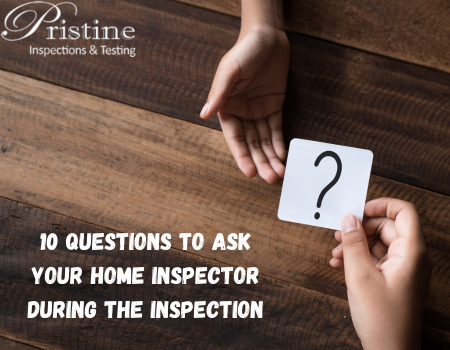Buying a home is one of the most significant investments you’ll ever make, so it’s crucial to understand the condition of the property before making a final decision. A home inspection can reveal hidden issues that may not be immediately apparent, helping you avoid costly repairs down the line. Here are ten essential questions to ask your home inspector during the inspection process.
-
What is the overall condition of the home?
This broad question will provide you with an overview of the property’s condition. It will help the inspector identify major issues that may need immediate attention. Understanding the overall condition of the home can give you a better sense of the maintenance and repairs needed in the short and long term.
-
Are there any structural issues?
The structural integrity of the home is paramount. Ask the inspector whether there are any issues with the foundation, walls, beams, or roofing that could be costly to fix. Structural problems can be a red flag, and addressing them can be expensive and time-consuming.
-
How is the roof condition?
The roof protects your home from the elements, so it’s important to know if it’s in good condition. Ask the inspector to check for signs of damage, wear, or leaks. They should also evaluate the roof’s age and whether it will need to be replaced soon. Roof repairs or replacements can be costly, and it’s important to factor this into your decision.
-
How is the plumbing system?
Plumbing issues can lead to costly repairs and even water damage if not addressed early. Ask the inspector to look at the pipes, drains, water heater, and fixtures. Ensure that the inspector checks for leaks, water pressure issues, or signs of corrosion. Knowing the state of the plumbing will help you budget for potential repairs or replacements.
-
Are there any signs of water damage or mold?
Water damage and mold can lead to serious health and structural problems. Ask the inspector to look for signs of leaks, standing water, or mold in areas like the basement, attic, and bathrooms. Mold remediation can be expensive, so it’s essential to catch any issues early.
-
Are there any electrical problems or safety concerns?
Electrical issues can be hazardous, leading to fires or injury. Ask the inspector to check the wiring, outlets, breaker panel, and light fixtures for any signs of damage, wear, or outdated systems. Ensure that they verify whether the home meets safety codes and if there are any safety concerns you should be aware of.
-
Is the HVAC system in good working order?
Heating, ventilation, and air conditioning (HVAC) systems are essential for comfort, especially in extreme weather. Ask the inspector to evaluate the condition of the furnace, air conditioner, and ductwork. They should check for any signs of inefficiency, leaks, or wear. Understanding the condition of the HVAC system can help you avoid costly repairs or replacements.
-
Are the windows and doors functioning properly?
Windows and doors contribute to the home’s energy efficiency and security. Ask the inspector to check that all windows and doors open and close properly, and look for any signs of air leaks or damage. Improperly sealed or damaged windows and doors can lead to increased energy costs and security concerns.
-
Are there any issues with insulation or ventilation?
Ask the inspector to assess the insulation in the attic, walls, and basement. They should also check for proper ventilation, which helps prevent moisture buildup and reduces the risk of mold. If the home has poor insulation or ventilation, it could result in higher utility bills or health problems.
-
What are the most urgent repairs or maintenance items?
It’s important to know which issues need immediate attention and which ones can wait. Ask the inspector to prioritize repairs based on urgency and safety concerns. This will help you understand what needs to be addressed right away and what can be handled later. If the inspection reveals a significant problem, such as a structural issue or major plumbing problem, you may want to negotiate the cost of repairs with the seller or reconsider your purchase.
Asking the right questions during a home inspection can give you valuable insights into the condition of the property and help you avoid unexpected expenses after closing. By addressing concerns such as the roof, plumbing, electrical system, and structural integrity, you can make a more informed decision and negotiate repairs or price adjustments with the seller. A thorough inspection will ensure that your new home is safe, functional, and ready to move into, giving you peace of mind as you embark on this important milestone.

